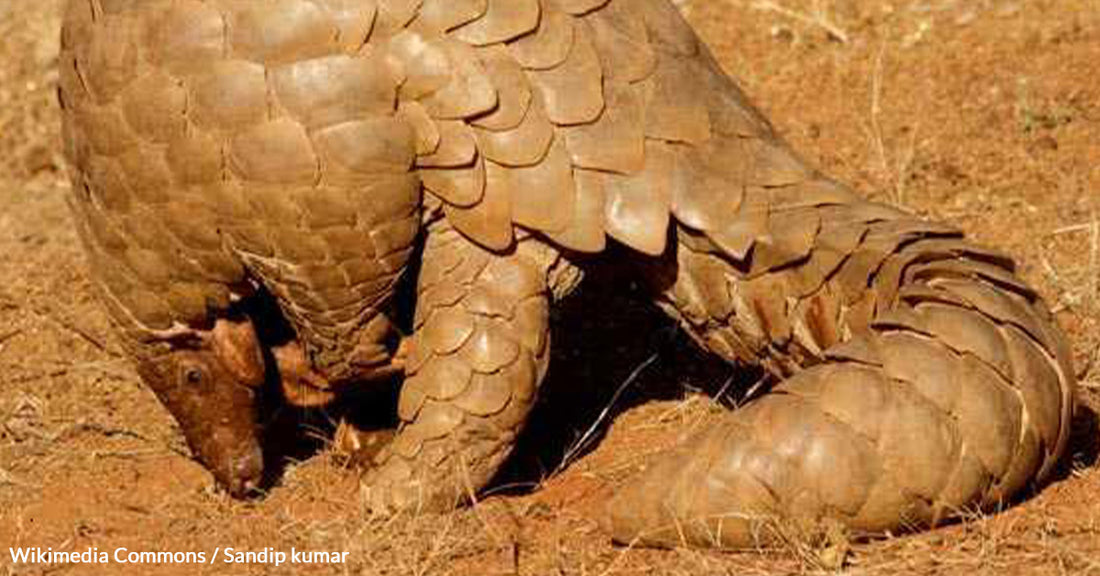New Pangolin Species Offers Hope Amidst Extinction Crisis
Matthew Russell
In the world of wildlife, few creatures are as enigmatic and endangered as pangolins.
These unique, scaly mammals have long been victims of relentless poaching and trafficking, pushing them to the brink of extinction. However, there's a glimmer of hope on the horizon - the recent discovery of a mysterious pangolin species, previously unknown to science.
 Photo: Wikimedia Commons / Rachad sanoussi, License: CC BY-SA 4.0 DEED
Photo: Wikimedia Commons / Rachad sanoussi, License: CC BY-SA 4.0 DEEDPangolins are the only mammals covered in protective keratin scales, similar to human fingernails.
Pangolins: The World's Most Trafficked Animals
Before we delve into the discovery itself, let's take a moment to understand the dire circumstances facing pangolins. These creatures, often likened to reptilian beings, boast a distinctive coat of scales, sharp claws, and a peculiar, sticky saliva. According to Save Pangolins, there are eight recognized pangolin species worldwide, with four inhabiting Asia and four in Africa. However, their striking appearance and unique features have made them a prime target for illegal hunting and trafficking.
As the African Wildlife Foundation reports, pangolins face dual threats: demand for their meat and the belief in the medicinal properties of their scales in certain traditional practices. This insatiable appetite for pangolin products has driven these elusive creatures to the edge of extinction.
 Photo: Wikimedia Commons / E. Jones, License: CC BY-SA 4.0 DEED
Photo: Wikimedia Commons / E. Jones, License: CC BY-SA 4.0 DEEDPangolins are often referred to as "scaly anteaters" due to their appearance and diet.
The Unexpected Discovery
Researchers studying confiscated pangolin scales in Hong Kong and China's Yunnan province between 2012 and 2019 stumbled upon an astonishing revelation. These scales, initially believed to belong to one of the four known Asian pangolin species, held a secret that had eluded scientists for centuries.
Through advanced genomic analysis, researchers identified genetic markers that did not match any known pangolin species. The shocking outcome was the emergence of a ninth pangolin species, CNN reports, previously undocumented by science. This newly discovered pangolin has been aptly named "Manis mysteria."
Although Manis mysteria remains shrouded in mystery due to its elusive nature, its recognition offers a glimmer of hope. Conservationists can now shift their focus to protect this newly unveiled species. With extinction looming over several pangolin species, every discovery like this is a vital lifeline for their survival.
 Photo: Wikimedia Commons / Sandip kumar, License: CC BY-SA 3.0 DEED
Photo: Wikimedia Commons / Sandip kumar, License: CC BY-SA 3.0 DEEDPangolins are solitary creatures, known for their nocturnal habits.
Uniting Conservation Efforts
The revelation of Manis mysteria is not just a matter of scientific curiosity; it has profound implications for pangolin conservation. Each species represents a unique thread in the intricate tapestry of biodiversity. Once a species goes extinct, its unique genetic heritage is lost forever. With the addition of Manis mysteria, the urgency of protecting these remarkable creatures becomes even more evident.
Advanced DNA technologies are now helping to identify these elusive creatures, paving the way for more discoveries in the future.
 Photo: Wikimedia Commons / D’Cruze N, Singh B, Mookerjee A, Harrington LA, Macdonald DW, License: CC BY-SA 4.0 DEED
Photo: Wikimedia Commons / D’Cruze N, Singh B, Mookerjee A, Harrington LA, Macdonald DW, License: CC BY-SA 4.0 DEEDOne of the main threats to pangolins is illegal hunting and trafficking for their scales and meat.
A Glimmer of Hope in the Darkness
In a world grappling with biodiversity loss and environmental challenges, the discovery of Manis mysteria serves as a beacon of hope. It reminds us of the vast mysteries still waiting to be uncovered within our natural world and underscores the critical importance of conservation efforts.
Manis mysteria is not just a new pangolin species; it's a testament to our ongoing commitment to preserving the remarkable diversity of life on Earth. As we continue to unveil the secrets of our planet's ecosystems, we must rally together to protect these remarkable creatures from the shadows of extinction.
Click below to save pangolins!

